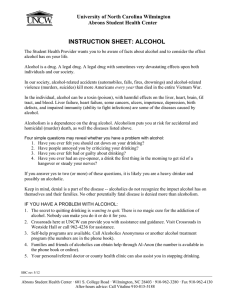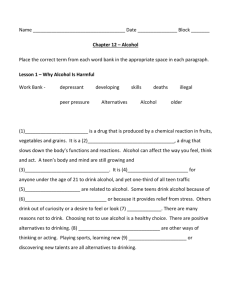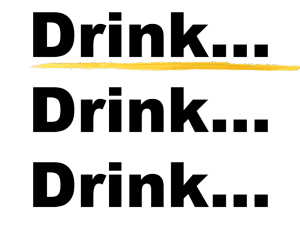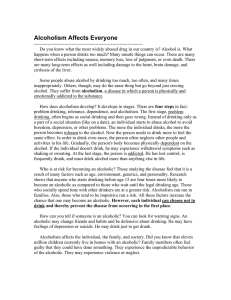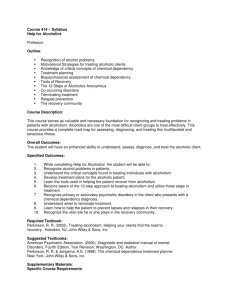A Family History of Alcoholism Are You at Risk?
advertisement
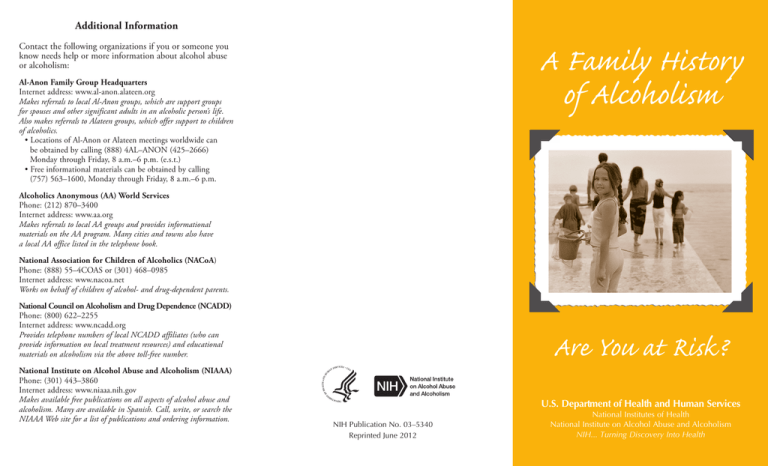
Additional Information Contact the following organizations if you or someone you know needs help or more information about alcohol abuse or alcoholism: A Family History of Alcoholism Al­Anon Family Group Headquarters Internet address: www.al­anon.alateen.org Makes referrals to local Al­Anon groups, which are support groups for spouses and other significant adults in an alcoholic person’s life. Also makes referrals to Alateen groups, which offer support to children of alcoholics. • Locations of Al­Anon or Alateen meetings worldwide can be obtained by calling (888) 4AL–ANON (425–2666) Monday through Friday, 8 a.m.–6 p.m. (e.s.t.) • Free informational materials can be obtained by calling (757) 563–1600, Monday through Friday, 8 a.m.–6 p.m. Alcoholics Anonymous (AA) World Services Phone: (212) 870–3400 Internet address: www.aa.org Makes referrals to local AA groups and provides informational materials on the AA program. Many cities and towns also have a local AA office listed in the telephone book. National Association for Children of Alcoholics (NACoA) Phone: (888) 55–4COAS or (301) 468–0985 Internet address: www.nacoa.net Works on behalf of children of alcohol­ and drug­dependent parents. National Council on Alcoholism and Drug Dependence (NCADD) Phone: (800) 622–2255 Internet address: www.ncadd.org Provides telephone numbers of local NCADD affiliates (who can provide information on local treatment resources) and educational materials on alcoholism via the above toll­free number. National Institute on Alcohol Abuse and Alcoholism (NIAAA) Phone: (301) 443–3860 Internet address: www.niaaa.nih.gov Makes available free publications on all aspects of alcohol abuse and alcoholism. Many are available in Spanish. Call, write, or search the NIAAA Web site for a list of publications and ordering information. Are You at Risk ? U.S. Department of Health and Human Services NIH Publication No. 03–5340 Reprinted June 2012 National Institutes of Health National Institute on Alcohol Abuse and Alcoholism NIH... Turning Discovery Into Health alcoholics do not become alcoholic. Research shows that many factors influence your risk of developing alcoholism. Some factors raise the risk while others lower it. f you are among the millions of people in this country who have a parent, grandparent, or other close relative with alcoholism, you may have wondered what your family’s history of alcoholism means for you. Are problems with alcohol a part of your future? Is your risk for becoming an alcoholic greater than for people who do not have a family history of alcoholism? If so, what can you do to lower your risk? I Many scientific studies, including research conducted among twins and children of alcoholics, have shown that genetic factors influence alcoholism. These findings show that children of alcoholics are about four times more likely than the general population to develop alcohol problems. Children of alcoholics also have a higher risk for many other behavioral and emotional problems. But alcoholism is not determined only by the genes you inherit from your parents. In fact, more than one­half of all children of Genes are not the only things children inherit from their parents. How parents act and how they treat each other and their children has an influence on children growing up in the family. These aspects of family life also affect the risk for alcoholism. Researchers believe a person’s risk increases if he or she is in a family with the following difficulties: • an alcoholic parent is depressed or has other psychological problems; • both parents abuse alcohol and other drugs; • the parents’ alcohol abuse is severe; and • conflicts lead to aggression and violence in the family. The good news is that many children of alcoholics from even the most troubled families do not develop drinking problems. Just as a family history of alcoholism does not guarantee that you will become an alcoholic, neither does growing up in a very troubled household with alcoholic parents. Just because alcoholism tends to run in families does not mean that a child of an alcoholic parent will automatically become an alcoholic too. The risk is higher but it does not have to happen. If you are worried that your family’s history of alcohol problems or your troubled family life puts you at risk for becoming alcoholic, here is some common­sense advice to help you: Avoid underage drinking—First, underage drinking is illegal. Second, research shows that the risk for alcoholism is higher among people who begin to drink at an early age, perhaps as a result of both environmental and genetic factors. Drink moderately as an adult—Even if they do not have a family history of alcoholism, adults who choose to drink alcohol should do so in moderation—no more than one drink a day for most women, and no more than two drinks a day for most men, according to guidelines from the U.S. Department of Agriculture and the U.S. Department of Health and Human Services. Some people should not drink at all, including women who are pregnant or who are trying to become pregnant, recovering alcoholics, people who plan to drive or engage in other activities that require attention or skill, people taking certain medications, and people with certain medical conditions. People with a family history of alcoholism, who have a higher risk for becoming dependent on alcohol, should approach moderate drinking carefully. Maintaining moderate drinking habits may be harder for them than for people without a family history of drinking problems. Once a person moves from moderate to heavier drinking, the risks of social problems (for example, drinking and driving, violence, and trauma) and medical problems (for example, liver disease, brain damage, and cancer) increase greatly. Talk to a health care professional—Discuss your concerns with a doctor, nurse, nurse practitioner, or other health care provider. They can recommend groups or organizations that could help you avoid alcohol problems. If you are an adult who already has begun to drink, a health care professional can assess your drinking habits to see if you need to cut back on your drinking and advise you about how to do that.
